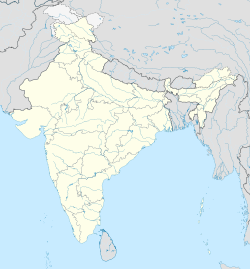Swamimalai
| Swamimalai சுவாமிமலை |
||
|---|---|---|
|
|
||
| State : |
|
|
| State : | Tamil Nadu | |
| District : | Thanjavur | |
| Sub-district : | Kumbakonam | |
| Location : | 10 ° 57 ′ N , 79 ° 20 ′ E | |
| Height : | 34 m | |
| Residents : | 7,289 (2011) | |
Swamimalai ( Tamil : சுவாமிமலை Suvāmimalai [ ˈsuʋaːmimalɛi ]) is a place in the Indian state of Tamil Nadu with around 7,300 inhabitants (2011 census). Swamimalai is an important place of pilgrimage for the Hindu god Murugan, who is popular in Tamil Nadu .
geography
Swamimalai is located in the Kaveri Delta in the Thanjavur district in central Tamil-Nadu in the immediate vicinity of the city of Kumbakonam on the northern bank of the Kaveri River. The distance to the center of Kumbakonam is eight kilometers, to the district capital Thanjavur it is 35 kilometers.
The road from Kumbakonam to Thiruvaiyaru (State Highway 22) leads through Swamimalai . From the nearby Kumbakonam there are numerous transport connections to other cities in Tamil Nadu. Swamimalai also has its own train station on the railway line from Mayiladuthurai via Thanjavur to Tiruchirappalli . This is about two kilometers away on the other side of the river.
population
76 percent of Swamimalai's residents are Hindus , 23 percent are Muslims and 1 percent are Christians . As in all of Tamil Nadu, the main language is Tamil, which is spoken by 99 percent of the population as their mother tongue.
Religious meaning
The Swaminathaswami Temple is located in Swamimalai, an important shrine of the Hindu god Murugan (Skanda). While this god plays practically no role in the practice of faith in northern India, he is one of the most popular deities among the Tamils under the name Murugan. Like many Murugan temples, the Swamimalai temple is built on a hill. In the case of Swamimalai, it is a small artificial hill with 60 steps leading up to it.
Swamimalai is one of six pilgrimage sites ( Arupadaividu ) in Tamil Nadu that are dedicated to Murugan. The six pilgrimage sites are each associated with different aspects of Murugan's mythology. According to the myth, Swamimalai is the place where Murugan taught his father Shiva the meaning of the sacred syllable Om . Therefore Murugan is revered here as his father's guru under the name Swaminatha ("the Lord of God"). The name Swamimalai means "the mountain of God".
Bronze casting
Swamimalai is a center of traditional bronze sculpture . The art of bronze casting using the lost form technique has been practiced since the Chola epoch (9th to 13th centuries) and in Swamimalai it is still practiced today using traditional methods. It is said that the artisans of Swamimalai were already involved in the decoration of the Brihadisvara temple in Thanjavur during the time of the Chola king Rajaraja I. Today they make bronze processional images for the founding of temples in India and overseas.
Web links
Individual evidence
- ^ Census of India 2011.
- ^ Census of India 2011: C-1 Population By Religious Community. Tamil Nadu.
- ↑ Census of India 2001: C-16 City: Population by Mother Tongue (Tamil Nadu), accessed under Tabulations Plan of Census Year - 2001 .
- ↑ Johannes Belz: "Introduction", in: Johannes Belz (Ed.): Shiva Nataraja. The cosmic dancer, Zurich: Museum Rietberg, 2008, pp. 20–21.


